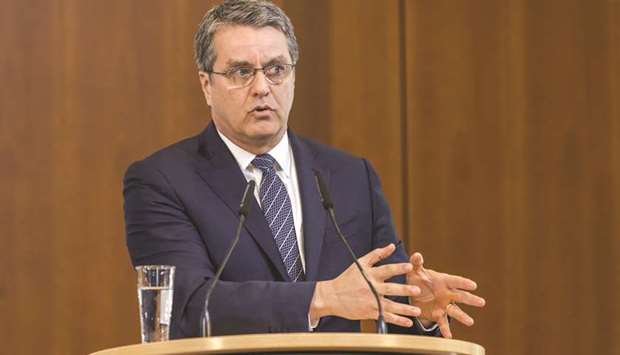The World Trade Organisation chief warned states yesterday that creating barriers to international trade would “jeopardise the global economy,” after Washington slapped steep tariffs on Chinese imports, heightening fears of a trade war.
“Disrupting trade flows will jeopardise the global economy at a time when economic recovery, though fragile, has been increasingly evident around the world,” WTO director-general Roberto Azevedo said in a statement, calling for “restraint and urgent dialogue”.
US President Donald Trump on Thursday hit China with tariffs on up to $60bn (€48.5bn) of imports to retaliate against the “theft” of American intellectual property, fuelling fears of a trade war between the world’s two largest economies.
Washington also launched yesterday a challenge before the WTO’s Dispute Settlement Body (DSB) against China over intellectual property breaches.
In his statement, Azevedo said that during a meeting of WTO’s Council of Trade in Goods, member states had discussed “a number of the specific tensions that have arisen between different members in recent weeks.”
“I encourage members to continue working through the WTO’s many forums and mechanisms to deal with their concerns and explore potential solutions,” he said, without naming any specific countries.
“Actions taken outside these collective processes greatly increase the risk of escalation in a confrontation that will have no winners, and which could quickly lead to a less stable trading system,” he warned.
“I again call for restraint and urgent dialogue as the best path forward to resolve these problems.”
The WTO, which strives to foster a level-playing field in global trade, can through its DSB act as a court to resolve trade disputes.
However Trump’s protectionist administration has levelled hostile rhetoric towards the WTO, and has nearly crippled its dispute resolution mechanism by blocking appointment of new judges. The European Union, Japan, Australia and others also joined a debate started by China and Russia over Trump’s steel and aluminium tariffs.
The EU representative dismissed US assertions that the steps were needed to protect national security, saying Washington was just trying to support its industry, a Geneva trade official said.
China and Russia have already said they are drawing up plans to retaliate to offset the impact of the tariffs.
China’s representative at the WTO meeting said the tariffs were “groundless” and violated WTO rules in multiple ways, said the trade official, who gave an account of the closed-door talks on condition of anonymity.
China’s representative said that the experience of the 1930s showed that trade barriers did the opposite of safeguarding national security, a reference to the US Great Depression and the build-up to World War Two.
Russia queried the basis for temporary exemptions to the tariffs, which Washington has granted to the EU, Argentina, Australia, Canada, Mexico, South Korea and Brazil, the official said.
South Korea said countries should be careful using national security as a reason for trade barriers, as it might set off a domino effect with other states piling in to justify measures to protect their own industries.
Japan said the US move was regrettable, and Turkey asked how it could be in line with WTO rules, the trade official added.
Others echoed the concerns about a domino effect, and said it might damage the WTO consensus, under which states have shied away from invoking security to justify barriers.
Brazil said the issue could only be addressed multilaterally, but added that it was encouraged by US efforts for bilateral talks on the issue, the official added.
The US representative at the meeting did not respond directly to the criticism but said its tariffs were “consistent” with the WTO’s General Agreement on Tariffs and Trade.
China has added two items that it wants to discuss under “any other business” at the meeting, which was already set to hear 15 trade concerns.
China plans to raise concerns about another package of tariffs announced by Trump on Thursday, to combat what he says is Chinese theft of US intellectual property.
China also plans to raise the issue of “US civil aviation security equipment measures”, diplomats said.
No further detail was immediately available.

WTO director-general Roberto Azevedo speaks during a news conference in Berlin (file). u201cDisrupting trade flows will jeopardise the global economy at a time when economic recovery, though fragile, has been increasingly evident around the world,u201d Azevedo said in a statement.
